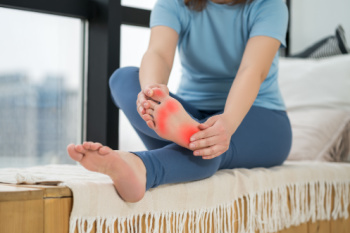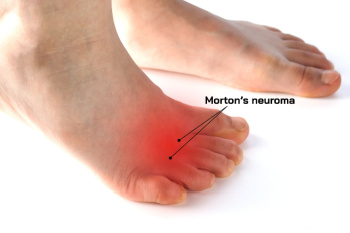April 2024
When Do I Need to See a Podiatrist?

Foot problems can signal underlying health issues that can worsen if ignored. For instance, neuropathy, resulting from nerve damage, can lead to numbness in the feet and make it hard to detect injuries. Conditions like diabetes frequently result in neuropathy, but a podiatrist is medically trained to offer treatments to manage symptoms. Changes in foot color can signal underlying issues like infections or poor circulation, and identifying and addressing these issues early is essential for effective treatment. Bunions, a deformity of the big toe, can cause discomfort and reduce mobility, but a podiatrist can recommend suitable footwear and a variety of treatment options to alleviate discomfort. Whether from high-impact exercises or wearing improper footwear, foot soreness should not be ignored. Podiatrists can prescribe custom orthotics to help alleviate pain and improve gait problems. Various musculoskeletal disorders can cause foot pain, and podiatrists can provide medication, foot padding, and other treatments to manage symptoms and improve mobility. If you have foot problems that interfere with daily activities, it is suggested that you schedule an appointment with a podiatrist.
If you are dealing with pain in your feet and ankles, you may want to seek help from a podiatrist. Feel free to contact Eveleigh Williams, DPM from Sole 2 Sole, PC. Our doctor can provide the care you need to keep you pain-free and on your feet.
What Is a Podiatrist?
A podiatrist is a doctor of podiatric medicine who diagnoses and treats conditions of the foot, ankle, and related structures of the leg. Your podiatrist may specialize in a certain field such as sports medicine, wound care, pediatrics, and diabetic care. Podiatrists have the ability to become board certified through training, clinical experience, and then taking an exam.
What Do Podiatrists Do?
On a daily basis, a podiatrist may perform the following activities:
- Diagnose foot ailments such as ulcers, tumors, fractures, etc.
- Use innovative methods to treat conditions
- Use corrective orthotics, casts, and strappings to correct deformities
- Correct walking patterns and balance
- Provide individual consultations to patients
It is very important that you take care of your feet. It’s easy to take having healthy feet for granted, however foot problems tend to be among the most common health conditions. Podiatrists can help diagnose and treat a variety of feet related conditions, so it is crucial that you visit one if you need assistance.
If you have any questions please feel free to contact our office located in Olympia Fields, IL . We offer the newest diagnostic and treatment technologies for all your foot and ankle needs.
Plantar Heel Pain
 Plantar heel pain, often referred to as plantar fasciitis, can cause discomfort and interfere with daily activities. It typically occurs when the band of tissue that supports the arch of the foot, called the plantar fascia, becomes irritated or inflamed. This condition often brings sharp pain in the heel, especially when taking the first steps in the morning or after prolonged periods of rest. Plantar heel pain can be triggered by various factors, including overuse, improper footwear, obesity, or certain foot structures. A podiatrist, or foot doctor, may recommend treatments such as stretching exercises, orthotic inserts, or in severe cases, corticosteroid injections and possibly surgery. With proper care and treatment, most people can find relief from plantar heel pain and get back to enjoying their daily activities without discomfort. If you are suffering from heel pain, it is suggested that you make an appointment with a podiatrist.
Plantar heel pain, often referred to as plantar fasciitis, can cause discomfort and interfere with daily activities. It typically occurs when the band of tissue that supports the arch of the foot, called the plantar fascia, becomes irritated or inflamed. This condition often brings sharp pain in the heel, especially when taking the first steps in the morning or after prolonged periods of rest. Plantar heel pain can be triggered by various factors, including overuse, improper footwear, obesity, or certain foot structures. A podiatrist, or foot doctor, may recommend treatments such as stretching exercises, orthotic inserts, or in severe cases, corticosteroid injections and possibly surgery. With proper care and treatment, most people can find relief from plantar heel pain and get back to enjoying their daily activities without discomfort. If you are suffering from heel pain, it is suggested that you make an appointment with a podiatrist.
Many people suffer from bouts of heel pain. For more information, contact Eveleigh Williams, DPM of Sole 2 Sole, PC. Our doctor can provide the care you need to keep you pain-free and on your feet.
Causes of Heel Pain
Heel pain is often associated with plantar fasciitis. The plantar fascia is a band of tissues that extends along the bottom of the foot. A rip or tear in this ligament can cause inflammation of the tissue.
Achilles tendonitis is another cause of heel pain. Inflammation of the Achilles tendon will cause pain from fractures and muscle tearing. Lack of flexibility is also another symptom.
Heel spurs are another cause of pain. When the tissues of the plantar fascia undergo a great deal of stress, it can lead to ligament separation from the heel bone, causing heel spurs.
Why Might Heel Pain Occur?
- Wearing ill-fitting shoes
- Wearing non-supportive shoes
- Weight change
- Excessive running
Treatments
Heel pain should be treated as soon as possible for immediate results. Keeping your feet in a stress-free environment will help. If you suffer from Achilles tendonitis or plantar fasciitis, applying ice will reduce the swelling. Stretching before an exercise like running will help the muscles. Using all these tips will help make heel pain a condition of the past.
If you have any questions please contact our office located in Olympia Fields, IL . We offer the newest diagnostic and treatment technologies for all your foot and ankle needs.
Risk Factors for Falling

As people age, the risk of a fall increases, but it should not be seen as inevitable. Falls can be caused by various factors, including weak muscles, poor balance, and dizziness. Foot problems like pain or deformities, and cognitive issues such as memory loss, and vision and hearing impairments, can also contribute to the risk of falls in seniors. Medications that induce drowsiness, excessive alcohol consumption, and certain bladder or bowel conditions can increase the likelihood of falling. Falls often result from an interaction of these factors, with a higher number of risk factors further elevating the potential for falls. In addition, falls can sometimes signal underlying health issues like constipation, infections, dehydration, or sudden confusion. A podiatrist can provide expert advice and interventions to address foot-related problems, improve balance, and reduce the risk of future falls. If instability causes you to lose your balance or fall frequently, it is suggested that you schedule an appointment with a podiatrist for a thorough exam and options for treatment.
Preventing falls among the elderly is very important. If you are older and have fallen or fear that you are prone to falling, consult with Eveleigh Williams, DPM from Sole 2 Sole, PC. Our doctor will assess your condition and provide you with quality advice and care.
Every 11 seconds, an elderly American is being treated in an emergency room for a fall related injury. Falls are the leading cause of head and hip injuries for those 65 and older. Due to decreases in strength, balance, senses, and lack of awareness, elderly persons are very susceptible to falling. Thankfully, there are a number of things older persons can do to prevent falls.
How to Prevent Falls
Some effective methods that older persons can do to prevent falls include:
- Enrolling in strength and balance exercise program to increase balance and strength
- Periodically having your sight and hearing checked
- Discuss any medications you have with a doctor to see if it increases the risk of falling
- Clearing the house of falling hazards and installing devices like grab bars and railings
- Utilizing a walker or cane
- Wearing shoes that provide good support and cushioning
- Talking to family members about falling and increasing awareness
Falling can be a traumatic and embarrassing experience for elderly persons; this can make them less willing to leave the house, and less willing to talk to someone about their fears of falling. Doing such things, however, will increase the likelihood of tripping or losing one’s balance. Knowing the causes of falling and how to prevent them is the best way to mitigate the risk of serious injury.
If you have any questions, please feel free to contact our office located in Olympia Fields, IL . We offer the newest diagnostic and treatment technologies for all your foot care needs.
How Being Overweight Affects the Feet

Studies show that carrying extra weight puts a significant amount of pressure on the feet, leading to various issues. For instance, overweight individuals are more likely to experience general foot pain and especially discomfort in the bottom of the heels when walking. Additionally, their feet might appear flatter, and they may have difficulty moving them as freely as they should. This is because extra weight can alter the foot's mechanics, causing it to roll inward more during walking. Furthermore, it is important to note that it is not just about the overall weight but also where the body stores fat. Excess fat, particularly around the feet, can increase foot pain. A podiatrist can offer personalized strategies to alleviate discomfort and improve foot function. If you are experiencing foot problems that may be connected to your weight, it is suggested that you schedule an appointment with a podiatrist for help.
Obesity has become very problematic at this point in time and can have extremely negative effects on the feet. If you’re an obese individual and are concerned about your feet, contact Eveleigh Williams, DPM from Sole 2 Sole, PC. Our doctor can provide the care you need to keep you pain-free and on your feet.
Obesity and Your Feet
Since your feet are what support your entire weight when standing, any additional weight can result in pain and swelling. Being overweight is one of the main contributors to foot complications.
Problems & Complications
Extra Weight – Even putting on just a few extra pounds could create serious complications for your feet. As your weight increases, your balance and body will shift, creating new stresses on your feet. This uneven weight distribution can cause pain, even while doing the simplest tasks, such as walking.
Diabetes – People who are overweight are at serious risk of developing type-2 diabetes, which has a drastic impact on the health of your feet. As you get older, your diabetes might worsen, which could lead to loss of feeling in your feet, sores, and bruises. You could also become more prone to various infections.
Plantar fasciitis – Pressure and stress that is placed on muscles, joints, and tendons can trigger plantar fasciitis, which is an inflammation of tissue that forms along the bottom of the foot.
If you have any questions please feel free to contact our office located in Olympia Fields, IL . We offer the newest diagnostic and treatment technologies for all your foot and ankle needs.
Reminder: When Was the Last Time...?
Treatment Methods for Morton's Neuroma

Morton's Neuroma, a benign tumor that grows in the nerve cells between the third and fourth toe, can be a painful and debilitating condition. Fortunately, a number of effective treatment options are available to relieve discomfort from Morton's neuroma. Conservative measures include wearing shoes with adequate room across the ball of the foot or using foot pads and arch supports. Custom orthotics can provide relief by reducing pressure on the affected nerve. Steroid injections into the painful area also can help alleviate inflammation and pain. In more severe cases, surgical interventions may be considered. Nerve decompression therapy, which involves reducing pressure on the nerves by cutting tendons that press on the nerves, can be effective. In some cases, removal of the affected nerve may be necessary to stop the pain altogether. If you are enduring pain from Morton's neuroma, it is suggested that you schedule an appointment with a podiatrist to determine the most appropriate treatment based on the severity of your symptoms.
Morton’s neuroma is a very uncomfortable condition to live with. If you think you have Morton’s neuroma, contact Eveleigh Williams, DPM of Sole 2 Sole, PC. Our doctor will attend to all of your foot care needs and answer any of your related questions.
Morton’s Neuroma
Morton's neuroma is a painful foot condition that commonly affects the areas between the second and third or third and fourth toe, although other areas of the foot are also susceptible. Morton’s neuroma is caused by an inflamed nerve in the foot that is being squeezed and aggravated by surrounding bones.
What Increases the Chances of Having Morton’s Neuroma?
- Ill-fitting high heels or shoes that add pressure to the toe or foot
- Jogging, running or any sport that involves constant impact to the foot
- Flat feet, bunions, and any other foot deformities
Morton’s neuroma is a very treatable condition. Orthotics and shoe inserts can often be used to alleviate the pain on the forefront of the feet. In more severe cases, corticosteroids can also be prescribed. In order to figure out the best treatment for your neuroma, it’s recommended to seek the care of a podiatrist who can diagnose your condition and provide different treatment options.
If you have any questions, please feel free to contact our office located in Olympia Fields, IL . We offer the newest diagnostic and treatment technologies for all your foot care needs.









